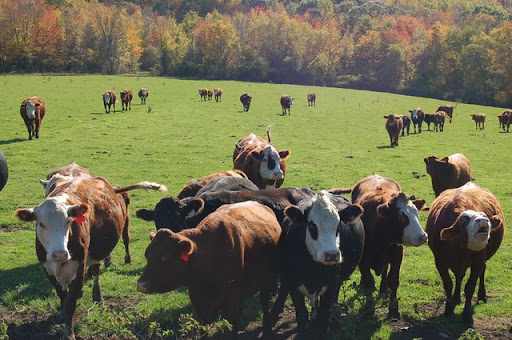So, now, once a month we pick up our share of 15 lbs of assorted meats from animals raised by Kim Denney and her family as part of Chestnut Farm's meat CSA (Community Supported Agriculture). In our red-and-white cooler, we get various cuts of beef, chicken, and pork (we opted out of the lamb) - all are farm-raised, free-range, and hormone- and antibiotic-free. And local. Again, I'm talking about animals that are raised on a place that more-or-less looks like the image in your head when you hear the word "farm" - something like this...NOT like this.
In addition to being better for us and better for the environment, the meat we get tastes unbelievable. The pork is like no other pork I have ever tasted. The chicken tastes more "chickeny". The beef is flat-out delicious. All in all, I couldn't be happier with our decision to go this route. Sure, it's more expensive than buying our meat at the supermarket, but I don't think it is all that much more (we pay $7-$8 per pound for everything - so while $7 for a pound of ground beef is quite a bit more than what we'd pay at Stop & Shop, we even out with the tenderloin steaks). Regardless, I think it is worth it - given the quality of the meat we are getting, I'm happy to pay more. As Michael Pollan explains in Omnivore's Dilemma, Americans currently spend the smallest percentage of their income on their food than ever before. It comes down to choices and we've made the conscious choice to spend more money on our food than our cell phones.
 On a non-food level, one of the best things about being part of the Chestnut Farms meat CSA has been the experience of getting to know the people that produce our food. Every month when I pick up our share, Kim is there to greet me. She spends a few minutes chatting with everyone and somehow remembers everyone's name. Each month before the pick-up, Kim sends out an info-packed email newsletter about the goings-on on the farm as well as what has been happening in her and her family's lives. There are regular "open barns" where the public is invited to spend an afternoon on the farm. Our kids have met Kim and they understand that she raises the animals that become our food and they are acutely aware that the food on our plates came from a once-living animal (a fact which makes our daughter Emma a tad uncomfortable, which I actually think is a good thing - more on this in a later post).
On a non-food level, one of the best things about being part of the Chestnut Farms meat CSA has been the experience of getting to know the people that produce our food. Every month when I pick up our share, Kim is there to greet me. She spends a few minutes chatting with everyone and somehow remembers everyone's name. Each month before the pick-up, Kim sends out an info-packed email newsletter about the goings-on on the farm as well as what has been happening in her and her family's lives. There are regular "open barns" where the public is invited to spend an afternoon on the farm. Our kids have met Kim and they understand that she raises the animals that become our food and they are acutely aware that the food on our plates came from a once-living animal (a fact which makes our daughter Emma a tad uncomfortable, which I actually think is a good thing - more on this in a later post).In my quest to provide my family with high-quality, healthy, local foods, I owe a huge debt of gratitude to Kim and her family. Their decision to do what they do has given me and my family the opportunity to choose where and how our food is produced.
P.S. check out this great article in a recent issue of edible Boston about Chestnut Farms.
(pig and cow images from Chestnut Farms website)